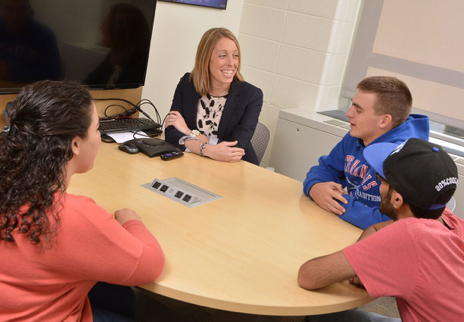Blog Entries
Stop Thinking about Networking as Networking
If you are anything like me, when you hear the word networking, your brain goes haywire.
I picture a “networking event”—A room full of people I don’t know, who are, for some reason, way smarter and more important than me. I also picture myself holding a glass of wine in one hand, balancing a plate of cheese and crackers in the other, and worried that I have something in my teeth. It terrifies me.
I should also point out that I’m a communication professor! Some might think I would love to saunter through a room, shaking hands, chit-chatting, you know…networking. But I’d rather stand in line at the DMV.
But here’s the thing, that is not how most networking happens. It is often born out of spontaneous, everyday conversations. And it thrives on sincere interest and meaningful connection.
So no, you do not have to waltz through every mixer event with ease (who can!?), but you do need to be curious, be proactive, and be prepared.
Be Curious:
- Go to every talk on campus that interests you. Pay attention and take notes. And then, and this might be the hard part, ask questions. Raise your hand during a Q&A session or stick around after the talk to chat with the speaker. Or both! The speaker might ask your name and major, they might give you their card. You might ask to interview them for a class project. They might tell you about an internship at their office. The possibilities are endless! You just have to show up, be brave, and express interest.
- Heck, even go to the talks on campus that aren’t interesting to you. A lot of students feel overwhelmed when thinking about a career path, so be a sponge for new topics. You might learn more about what you don’t like, which is a helpful way to narrow down your list of things you want to do.
A note: Don’t fake it. If you go to a talk and nothing piques your curiosity, no problem. Go you, you tried! But notice when you do feel interested in something—take note of who is involved in that field, and talk with them. The more events/lectures/talks/debates you attend, the higher your chances of broadening your network in a meaningful way.
Be Proactive:
- Talk with your professors about your goals. Faculty members get loads of information about internship and jobs, and they know people in their field. If you talk with them about your interests and aspirations, they’ll have you on their radar when opportunities for students come their way.
- The same goes for staff. If a staff member has a job like one you want, ask them about it. Their insights alone will be invaluable, but a conversation like that might also be the start of an important professional relationship.
- Even if you don’t want a job in higher education, your faculty and staff may be able to connect you to someone they know in the field of your choice. If I have a student who wants to run their own business, I can’t help them personally, but I could connect them to my friend who runs his own business as a potential mentor.
- Networking opportunities are everywhere, you just have to keep your eyes peeled. If your suitemate learns that you’re an accounting major and tells you that her mom is an accountant, don’t just say “Nice” and move on. Ask if she would be willing to talk with you about her work, maybe down the road she’ll be a familiar face on a panel for your first job interview.
I could go on and on with examples, but the bottom line is many potential connections are out there, you just have to be aware of them. And, thankfully, most of them occur without you having to eat your cheese and crackers from a plate balanced in the crook of your arm.
Be Prepared:
- As Louis Pasteur said, “Fortune favors the prepared mind.” So, get clear on what your interests and goals are. We all know that if you were attending a formal networking event or a job interview, you would show up knowing what you want and with relevant questions prepared. Now that you see how networking happens everywhere, you should always be ready!
- If you get the opportunity to chat with a friend’s uncle who has your absolute dream job, you’ll want to have some idea of questions to ask about how he got there and what it’s like.
The preparedness step circles back to the first point: Be curious! If you have done your homework of gathering information about topics, jobs, graduate programs, etc., when you bump into someone that might be a good contact for you, you’ll feel confident in talking with them, making a strong first impression, and building your professional network.


Follow Career Development Center on Social
CDC on Facebook
Stay up to date with Career Development Center's posts on Facebook.
CDC on LinkedIn
See the latest posts on LinkedIn by the Career Development Center. Follow them on LinkedIn.
CDC on Instagram
See the latest posts on Instagram by Career Development Center.




